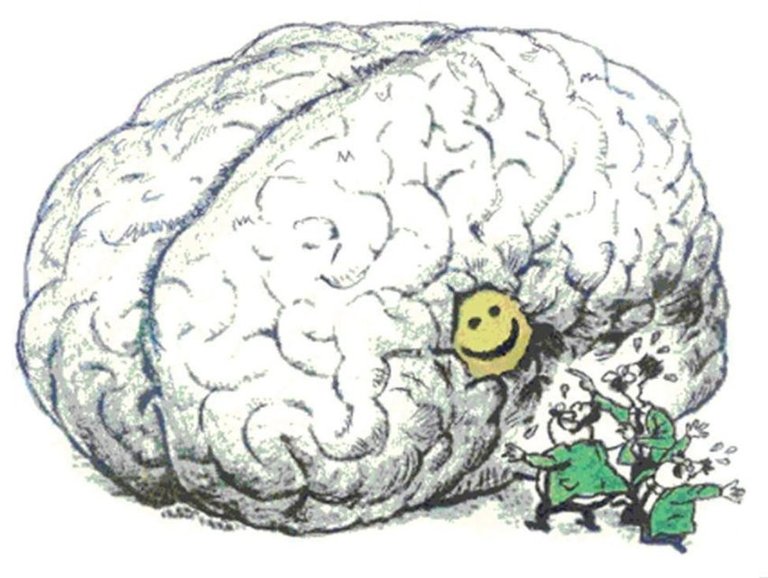Two hunters are walking through a field. Suddenly, one of them clutches his chest, falls to the ground , and is motionless. The other hunter, thinking quickly, whips out his cell phone and calls the hospital. He is connected to the emergency room physician. "Doctor, he says excitedly, My buddy and me were hunting when he just fell down. He's unconscious. He maybe had a heart attack. I think he's dead! I don't know what to do. Tell me what to do!"
"All right, calm down," replies the doctor, I'm going to talk you through this. Now, first, let's be sure the guy's dead." A shot is heard. The hunter gets back on the phone, "Ok, doc, now what?"
If you chuckled at that story, it's due to the incongruity between what you were expecting to happen and what did happen. When the ER doctor said to the hunter, "Now, first, let's be sure the guy's dead," you anticipated that the man would splash some water on his friend's face, slap him, or take some such action. The gun shot and the question, "Okay, doc, now what?" were unexpected.
Occurrences that are unanticipated and surprise us are significant. The brain responds energetically to novel events and etches them into memory for future reference. Remembering that what appears to be a vine could actually be a snake has obvious survival value. Humor takes advantage of the brain's sensitivity to surprise.
The Brain's Involvement in Laughter
Investigators have determined that laughter starts to develop between three and four months of age. It enhances the emotional bond between parent and child critical to survival. Three areas of the brain are involved with laughter. The frontal lobe functions in understanding or "getting" a joke.
The limbic system, and in particular the hypothalamus, is responsible for the emotional interpretation of humor. Physical response is generated in the motor cortex, which sends signals to various muscles of the face and body.
The triggering of laughter is not under conscious control. Laughing on cue, without a precipitating event, is very difficult to do convincingly. Some researchers believe laughter is contagious because humans possess a neurological apparatus which actuates a cascade of cerebral events eventuating in what we recognize as laughter.
A recent investigation suggests why laughter is so gratifying and sought after. It was found that laughing stimulates the nucleus accumbens, the same brain area involved with feelings of love.
Sociological Considerations
A variety of sources lend evidence to indicate that laughter is not merely a cerebral exercise and may serve a more primary purpose. The most primitive part of the nervous system, the brain stem, is now thought to incite laughter. The fact that the region responsible for such vital physiological functions as respiratory, cardiac and vasomotor regulation is involved with the production of laughter as well is significant.
Another indication of laughter's prominent influence on survival is that related activity can be observed in nonhuman mammals.
Also, laughter can be activated by stimuli unrelated to humor such as marijuana or alcohol, or states of nervousness. Pathological laughter, where a person laughs spontaneously without experiencing happiness, can develop from diseases such as amyotrophic lateral sclerosis or brain trauma. It is another clue to the very basic nature and critical function of laughter.
So why is a behavior as seemingly whimsical as laughter an apparently essential adaptation? We are not aware of the positive consequences of laughter while we are engaged in acts of hilarity. People visit comedy clubs and movie theaters because laughter is a gratifying experience in itself. Studies suggest that it produces pleasant sensations by facilitating the release of endorphins and suppressing stress hormones.
Among the health benefits associated with laughter are pain relief, immune system enhancement, and stimulation of both circulation and organs (heart, lungs). It also makes dealing with life's trying situations easier. But these salubrious perks may just be concurrent results of laughter's real purpose: gathering people together.
So, What's So Funny?
In one sense, nothing. Laughter is far too important to be mere fun. It's role in promoting social cohesion is well appreciated. Mutual laughter induces trust by discharging social tension, thereby aiding the establishment and nurturing of relationships. So, go ahead and laugh. It's good for you.
Rene Descartes walks into a bar. The bartender says, "Can I get you a beer?" "No, I think not," Descartes replies,and immediately disappears.
Get it?
Sources:
Mind Wide Open by Steven Johnson (Ebook)
How Stuff Works - How Laughter Works
Science Direct - Concepts of Laughter and Humor




A real unique human characteristic. I'm not aware of other species capable of laughter. Unless we never noticed? 😀
Interesting! Indeed, unless we never noticed :) probably not.. we humans are unique in all aspect :D
Hi @quitepoetic. This is a great article. However, I would like to point out one thing:
Please note that I'm not in any way, try to disapprove your work. You've done an excellent job here, but you can make it better. If you have any problem regarding STEM-related articles, you can join steemSTEM Discord Channel and we will be glad to assist you.
Thank you for pointing that out, maybe on my upcoming posts will considering the suggestions.
Hey there! You were featured on the #95th edition of steemitfamilyph's featured posts. Congratulations!